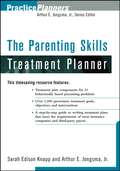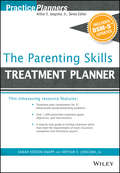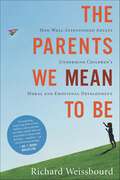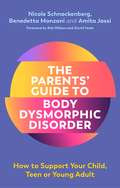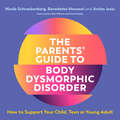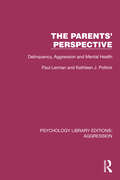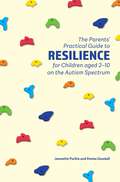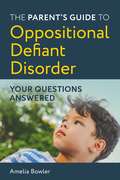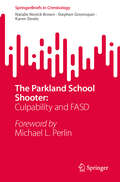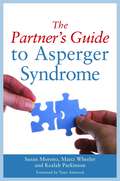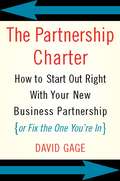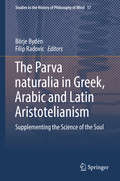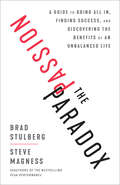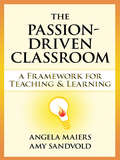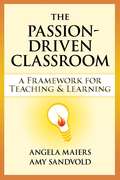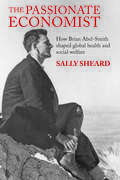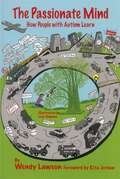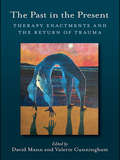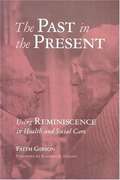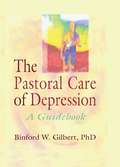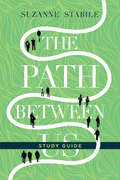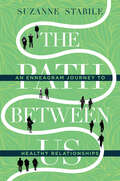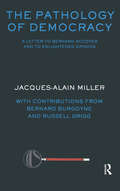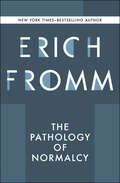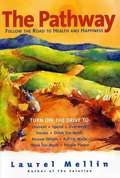- Table View
- List View
The Parenting Skills Treatment Planner
by Knapp Arthur E. Jongsma Sarah EdisonThe Parenting Skills Treatment Planner provides all the elements necessary to quickly and easily develop formal treatment plans that satisfy the demands of HMOs, managed care companies, third-party payors, and state and federal review agencies. A critical tool for mental health professionals addressing today's complex family structures and the increased pressures on children and adolescents from school, peers, and the general culture Saves you hours of time-consuming paperwork, yet offers the freedom to develop customized treatment plans for parents and other caregivers Organized around 31 main presenting problems with a focus on giving parents the skills they need to effectively help their children navigate contemporary issues such as the trauma associated with divorce, school pressures, and sexual abuse Over 1,000 well-crafted, clear statements describe the behavioral manifestations of each relational problem, long-term goals, short-term objectives, and clinically tested treatment options Easy-to-use reference format helps locate treatment plan components by behavioral problem or DSM-IVTR(TM) diagnosis Includes a sample treatment plan that conforms to the requirements of most third-party payors and accrediting agencies (including HCFA, JCAHO, and NCQA)
The Parenting Skills Treatment Planner, with DSM-5 Updates (PracticePlanners)
by Arthur E. Jongsma Jr. Sarah Edison KnappThis timesaving resource features: Treatment plan components for 31 behaviorally based presenting problems Over 1,000 prewritten treatment goals, objectives, and interventions A step-by-step guide to writing treatment plans that meet the requirements of most insurance companies and third-party payors The Parenting Skills Treatment Planner provides all the elements necessary to quickly and easily develop formal treatment plans that satisfy the demands of HMOs, managed care companies, third-party payors, and state and federal review agencies. A critical tool for mental health professionals addressing today's complex family structures and the increased pressures on children and adolescents from school, peers, and the general culture Saves you hours of time-consuming paperwork, yet offers the freedom to develop customized treatment plans for parents and other caregivers Organized around 31 main presenting problems with a focus on giving parents the skills they need to effectively help their children navigate contemporary issues such as the trauma associated with divorce, school pressures, and sexual abuse Over 1,000 well-crafted, clear statements describe the behavioral manifestations of each relational problem, long-term goals, short-term objectives, and clinically tested treatment options Easy-to-use reference format helps locate treatment plan components by behavioral problem Includes a sample treatment plan that conforms to the requirements of most third-party payors and accrediting agencies (including HCFA, JCAHO, and NCQA)
The Parents We Mean to Be: How Well-Intentioned Adults Undermine Children's Moral and Emotional Development
by Richard WeissbourdA wake-up call for a national crisis in parenting—and a deeply helpful book for those who want to see their own behaviors as parents with the greatest possible clarity.Harvard psychologist Richard Weissbourd argues incisively that parents—not peers, not television—are the primary shapers of their children’s moral lives. And yet, it is parents’ lack of self-awareness and confused priorities that are dangerously undermining children’s development.Through the author’s own original field research, including hundreds of rich, revealing conversations with children, parents, teachers, and coaches, a surprising picture emerges. Parents’ intense focus on their children’s happiness is turning many children into self-involved, fragile conformists.The suddenly widespread desire of parents to be closer to their children—a heartening trend in many ways—often undercuts kids’ morality. Our fixation with being great parents—and our need for our children to reflect that greatness—can actually make them feel ashamed for failing to measure up. Finally, parents’ interactions with coaches and teachers—and coaches’ and teachers’ interactions with children—are critical arenas for nurturing, or eroding, children’s moral lives.Weissbourd’s ultimately compassionate message—based on compelling new research—is that the intense, crisis-filled, and profoundly joyous process of raising a child can be a powerful force for our own moral development.
The Parents' Guide to Body Dysmorphic Disorder: How to Support Your Child, Teen or Young Adult
by Amita Jassi Nicole Schnackenberg Benedetta MonzaniThe first book offering support for parents and carers of children and young people with Body Dysmorphic Disorder (BDD), this guidebook explains the condition as well as the impact that it may have in education settings, family life and socialisation.The guide begins by explaining how and why BDD emerges, before moving onto an exploration of how the mental health condition presents itself emotionally, psychologically, physically and behaviourally. It then offers practical advice and guidance for parents and carers on talking to their child about BDD, seeking professional treatment, considering medication, managing social media use, working with schools to build a recovery team and more.The Parent's Guide to Body Dysmorphic Disorder is an essential guidebook for parents of children of children and young people with BDD.
The Parents' Guide to Body Dysmorphic Disorder: How to Support Your Child, Teen or Young Adult
by Amita Jassi Nicole Schnackenberg Benedetta MonzaniThe first book offering support for parents and carers of children and young people with Body Dysmorphic Disorder (BDD), this guidebook explains the condition as well as the impact that it may have in education settings, family life and socialisation.The guide begins by explaining how and why BDD emerges, before moving onto an exploration of how the mental health condition presents itself emotionally, psychologically, physically and behaviourally. It then offers practical advice and guidance for parents and carers on talking to their child about BDD, seeking professional treatment, considering medication, managing social media use, working with schools to build a recovery team and more.The Parent's Guide to Body Dysmorphic Disorder is an essential guidebook for parents of children of children and young people with BDD.(P) 2020 Hodder & Stoughton Ltd
The Parents' Perspective: Delinquency, Aggression and Mental Health (Psychology Library Editions: Aggression)
by Paul Lerman Kathleen J. PottickOriginally published in 1995, this book describes and analyzes the way urban parents view the problems of their adolescent children, and the way they have tried to cope with and seek help for them. Based on the study of parents as third-party help-seekers in and around Newark, New Jersey, the book sheds light on the types of problems experienced by adolescents in similar communities throughout the country.By focusing on the parents, who usually bring the youth into the legal or mental health system, this book provides numerous unique insights into the nature of problems among urban youths. It describes how certain legal and psychological problems often coexist, examines the reasons for this, and shows how this knowledge can be used to improve the delivery of youth and family services.
The Parents' Practical Guide to Resilience for Children aged 2-10 on the Autism Spectrum: Two to Ten Years
by Jeanette Purkis Emma GoodallChildren and young people with autism have the capacity to be independent and resilient which can help them live independently or be supported to live a fulfilling life and reach their full potential. This book empowers parents of autistic children aged two to ten to help them promote resilience in their child. Full of suggestions and simple activities, this easy-to-use resource will help guide parents on how to build the foundations of resilience and independence for situations such as school, new environments and relationships with other children. It includes information about the main developmental stages for children on the autism spectrum, and will take parents through life events and milestones at different ages and identify where difficulties and barriers to resilience may arise and how to address them.
The Parent’s Guide to Oppositional Defiant Disorder: Your Questions Answered
by Amelia BowlerThis parenting guide to ODD offers expert information on your child's condition, provides insight and empathy to what they are going through, and equips and empowers you to make practical changes in your parenting approaches. It provides an overview of tried-and-tested techniques from a mother of a child with ODD to support you in response to typical questions you may have:· "Why is my child acting this way?"· "What does this say about me?"· "Why doesn't my child respond to punishment or reward?" · "What am I supposed to do next?"Overall this book teaches you how to avoid common mistakes in responding to ODD, the crossover with similar diagnoses such as ADHD and how to distinguish the disorders, how to improve your own resilience and confidence to communicate effectively with your strong-willed child, and start rebuilding the relationship you have.
The Parkland School Shooter: Culpability and FASD (SpringerBriefs in Criminology)
by Karen Steele Stephen Greenspan Natalie Novick BrownThis brief explores the justification of the death penalty, using the 2018 Marjorie Stoneman Douglas High School shooting in Parkland, Florida, as a case study. The authors argue that when an offender’s impairments severely impact their ability to make rational decisions, the death penalty is unjustified, regardless of the crime's severity. The book examines the case of Nikolas Cruz, the school shooter diagnosed with fetal alcohol spectrum disorder (FASD), including: The nature of FASD, how it was measured, and how it manifested in Cruz. The impact of FASD on Cruz’s adaptive functioning. The concept of “psychiatric overshadowing” and how it led to the oversight of Cruz’s FASD and associated brain damage by many mental health experts. The broader implications of FASD, with a recommendation to expand death penalty exemptions to include disorders equivalent to intellectual disabilities (ID). By focusing on the highly controversial Cruz case, the authors—key experts from the trial—offer insights into FASD and its often-overlooked role in determining criminal responsibility and sentencing. This book is essential for forensic psychologists, psychiatrists, mental health professionals, FASD/DD specialists, researchers, and legal professionals involved in death penalty defense work.
The Partner's Guide to Asperger Syndrome
by Tony Attwood Susan J. Moreno Keelah Parkinson Marci WheelerAdults with Asperger Syndrome (AS) often have difficulties acquiring relationship skills due to the defining characteristics of the syndrome, experiences with peers during childhood and adolescence, and the expectations of their partners. However, an increasing number do go on to achieve happy and successful long-term relationships with non-spectrum (NS) partners. This supportive book will give NS partners a better understanding of NS/AS relationships, and of what other NS partners have found to be helpful in terms of better understanding themselves and their partners, and enriching their relationships. Drawing on interviews with over 100 people in NS/AS relationships, as well as on their own experiences of having family members on the autism spectrum, the authors explore the key differences which may impact upon AS/NS relationships, such as communication, social skills, and sensory issues, and offer tried-and-tested advice on how to surmount difficulties and make things work. The book includes chapters on coping with stress and meltdowns, parenting, positive AS qualities and how to use them to their full advantage in a relationship, as well as advice on how the NS partner can ensure that their own needs are met. This book will provide support and encouragement to those in a relationship with someone who has been diagnosed with AS, or who is suspected of having AS, and will also be a useful resource for counsellors and other professionals who wish to deepen their understanding of AS/NS relationships.
The Partnership Charter: How To Start Out Right With Your New Business Partnership (or Fix The One You're In)
by David GageIn The Partnership Charter, psychologist and business mediation expert David Gage offers a comprehensive guide to the art of establishing and maintaining a business partnership. The centerpiece of his approach is the Partnership Charter, a document that clearly outlines the goals, expectations, responsibilities, and relationships of the principals. The charter identifies potential sources of conflict and how they will be resolved, while addressing such sensitive issues as personal styles, values, money, and power. Illustrating every principle through engaging stories drawn from Gage's front-line experience consulting to business partners, as well as interviews with the founding partners of such successful businesses as Progressive Insurance Company and Manpower, Inc. , The Partnership Charter dispels common myths and presents a practical framework for launching, building, and sustaining a thriving business partnership.
The Parva naturalia in Greek, Arabic and Latin Aristotelianism: Supplementing the Science of the Soul (Studies in the History of Philosophy of Mind #17)
by Börje Bydén Filip RadovicThis book investigates Aristotelian psychology through his works and commentaries on them, including De Sensu, De Memoria and De Somno et Vigilia. Authors present original research papers inviting readers to consider the provenance of Aristotelian ideas and interpretations of them, on topics ranging from reality to dreams and spirituality. Aristotle’s doctrine of the ‘common sense’, his notion of transparency and the generation of colours are amongst the themes explored.Chapters are presented chronologically, enabling the reader to trace influences across the boundaries of linguistic traditions. Commentaries from historical figures featured in this work include those of Michael of Ephesus (c. 1120), Albert the Great and Gersonides’ (1288–1344). Discoveries in 9th-century Arabic adaptations, Byzantine commentaries and Renaissance paraphrases of Aristotle’s work are also presented.The editors’ introduction outlines the main historical developments of the themes discussed, preparing the reader for the cross-cultural and interdisciplinary perspectives presented in this work. Scholars of philosophy and psychology and those with an interest in Aristotelianism will highly value the original research that is presented in this work.The Introduction and Chapter 4 of this book are available open access under a Creative Commons Attribution 4.0 International License via link.springer.com.
The Passion Paradox: A Guide to Going All In, Finding Success, and Discovering the Benefits of an Unbalanced Life
by Brad Stulberg Steve MagnessThe coauthors of the bestselling Peak Performance dive into the fascinating science behind passion, showing how it can lead to a rich and meaningful life while also illuminating the ways in which it is a double-edged sword. Here’s how to cultivate a passion that will take you to great heights—while minimizing the risk of an equally great fall. Common advice is to find and follow your passion. A life of passion is a good life, or so we are told. But it's not that simple. Rarely is passion something that you just stumble upon, and the same drive that fuels breakthroughs—whether they're athletic, scientific, entrepreneurial, or artistic—can be every bit as destructive as it is productive. Yes, passion can be a wonderful gift, but only if you know how to channel it. If you're not careful, passion can become an awful curse, leading to endless seeking, suffering, and burnout. Brad Stulberg and Steve Magness once again team up, this time to demystify passion, showing readers how they can find and cultivate their passion, sustainably harness its power, and avoid its dangers. They ultimately argue that passion and balance--that other virtue touted by our culture--are incompatible, and that to find your passion, you must lose balance. And that's not always a bad thing. They show readers how to develop the right kind of passion, the kind that lets you achieve great things without ruining your life. Swift, compact, and powerful, this thought-provoking book combines captivating stories of extraordinarily passionate individuals with the latest science on the biological and psychological factors that give rise to—and every bit as important, sustain—passion.
The Passion-Driven Classroom: A Framework for Teaching & Learning
by Angela Maiers Amy Sandvold<P>Discover ways to cultivate a thriving and passionate community of learners – in your classroom! In this book, educators and consultants Angela Maiers and Amy Sandvold show you how to spark and sustain your students’ energy, excitement, and love of learning. <P>This book presents ideas for planning and implementing a Clubhouse Classroom, where passion meets practice every day. In the Clubhouse Classroom, students learn new skills and explore their talents with the help of educators who are invigorated by the subjects they teach. <P>Contents include: <br>Achievement Gap or Passion Gap?, <br>A Passion-Driven Classroom: The Essentials, <br>Organizing the Clubhouse Classroom, <br>Managing the Clubhouse Classroom. <br>Learn how to move away from prescription-driven learning toward passion-driven learning, and begin to make a real difference in the lives of your students. <P>These strategies will help teachers in Grades K-12 put the "heart" back into teaching and learning – and make a lasting impact as educators!
The Passion-Driven Classroom: A Framework for Teaching and Learning
by Angela Maiers Amy SandvoldDiscover ways to cultivate a thriving and passionate community of learners in your classroom! In this book, educators and consultants Angela Maiers and Amy Sandvold show you how to spark and sustain your students energy, excitement, and love of learning. <p><p> This book presents ideas for planning and implementing a Clubhouse Classroom, where passion meets practice every day. In the Clubhouse Classroom, students learn new skills and explore their talents with the help of educators who are invigorated by the subjects they teach. <p> Learn how to move away from prescription-driven learning toward passion-driven learning, and begin to make a real difference in the lives of your students. These strategies will help teachers in Grades K-12 put the "heart" back into teaching and learning and make a lasting impact as educators!
The Passionate Economist: How Brian Abel-Smith Shaped Global Health and Social Welfare (LSE Pioneers in Social Policy)
by Sally SheardBrian Abel-Smith was one of the most influential expert advisers of the 20th century in shaping social welfare. He was a modern-day Thomas Paine, driven by a strong socialist mission to improve the lives of the poorest. This valuable and accessible book is the first biography of Abel-Smith. It takes a historical perspective to analyse the development of health and social welfare systems since the 1950s, exposing the critical impact of long-running debates on poverty and state responsibility, especially in Britain. This book also provides the first comparative study of how developing countries sought better health and social welfare, enabled by the World Health Organization and other agencies for whom Abel-Smith regularly worked. This book offers an engaging and useful study for students and researchers in health and social policy, history, politics and economics and interested general readers. It will also be essential reading for professionals working in those government ministries and institutions that Brian Abel-Smith helped to shape. LSE Pioneers in Social Policy Brian Abel-Smith, Richard Titmuss and Peter Townsend, all based at the London School of Economics and Political Science, made major contributions to the development of policies on the elderly, health care, law, poverty and welfare in the 20th century. This series of biographies tells the stories of these outstanding individuals: their backgrounds, ideas and work.
The Passionate Mind
by Wendy LawsonIn her new book, Wendy Lawson examines traditional theories about the autism spectrum (AS) and reveals their gaps and shortcomings. Showing that a completely different way of thinking about AS is needed, she sets forward the theory of Single Attention and Associated Cognition in Autism (SAACA), an approach that explains autism in terms of the unique learning style of AS individuals. The SAACA approach suggests that whereas neurotypical people can easily shift their attention from one task to another, those on the autism spectrum tend to use just one sense at a time, leading to a deep, intense attention. From the perspective of this new approach, Wendy describes practical outcomes for individuals, families, and places of education and employment, and shows that when the unique learning style of AS is understood, valued, and accommodated, AS individuals can be empowered to achieve their fullest potential. This is a fascinating read for anyone with a personal or professional interest in the autism spectrum, including clinical practitioners, educators, researchers, individuals on the spectrum and their families, teachers, occupational therapists, and other professionals.
The Past in the Present: Therapy Enactments and the Return of Trauma
by David Mann Valerie CunninghamThe Past in the Present brings together, for the first time, contemporary ideas from both the psychoanalytic and humanistic therapy traditions, looking at how trauma and enactments affect therapeutic practice. Enactments are often experienced as a crisis in therapy and are understood as symbolic interactions between the client and therapist, where personal issues of both parties become unconsciously entwined. This is arguably especially true if the client has undergone some form of trauma. This trauma becomes enacted in the therapy and becomes a turning point that significantly influences the course of therapy, sometimes with creative or even destructive effect. Using a wealth of clinical material throughout, the contributors show how therapists from different therapeutic orientations are thinking about and working with enactments in therapy, how trauma enactment can affect the therapeutic relationship and how both therapist and client can use it to positive effect. The Past in the Present will be invaluable to practitioners and students of analytic and humanistic psychotherapy, psychoanalysis, analytic psychology and counselling.
The Past in the Present: Using Reminiscence in Health and Social Care
by Faith GibsonThe Past in the Present is an essential reminiscence resource for nursing staff and paraprofessionals, social workers, psychologists, occupational therapists, activity directors, recreation therapists, professionals providing training programs for volunteers and family caregivers, community groups, and school and college programs providing community service and intergenerational outreach.
The Pastoral Care of Depression: A Guidebook
by Harold G Koenig Binford W GilbertWhat is depression, and what are its many and varied types? Who becomes depressed, and how can it be recognized? How can depression be measured, and what are its suicidal potentialities? What are the therapeutic interventions the pastor can use in helping people who are undergoing the pain of depression? The Pastoral Care of Depression: A Guidebook answers these questions and many more. With a focus on the pastor as an instrument of healing in cooperation with families, physicians, and other mental health professionals, this book will help you understand some of the current research and procedures used in helping people suffering from depression. As the frontline mental health workers in many communities, pastors need confidence, competence, and skill in handling people with emotional problems. As Author Binford W. Gilbert explains, “Depression is among the most treatable of major illnesses. It enters the realm of the spiritual and demands the best of the pastoral leader to guide, assist, and enhance the struggle for peace and soundness of mind and body.” The Pastoral Care of Depression helps caregivers by overcoming the simplistic myths about depressive disorders and probing the real issues. This book covers: a thorough description of clinical depression predisposing factors that may lead to depression the need for a multidisciplinary approach, and the role of the pastor on the treatment team the importance of church and family involvement diagnosis--the ability to distinguish between normal grief, ordinary blues, situational depression, and clinical depression ministers’own emotional, physical, mental, and relational health the pastor’s privileged role that gives him/her unique abilities and opportunitiesA valuable resource for pastors, chaplains, counselors, psychiatrists, psychologists, physicians, family members, and teachers of pastoral care, The Pastoral Care of Depression is meant to inspire action-oriented counseling; to establish cooperative relationships between ministers, families, and the medical community; to carry out responsible and innovative creative therapeutic interventions; and to treat the whole human being.
The Path Between Us Study Guide
by Suzanne StabileHow do we understand the motivations and dynamics of the different personality types we see in our intimate partners, our friends, or in our professional lives? This six-session study guide is a content-rich companion to Suzanne Stabile’s The Path Between Us, exploring the nine Enneagram types and how they experience relationships. Individuals and groups will gain deeper insights about themselves, their types, and others’ personalities so that they can have loving, mature, and compassionate relationships.
The Path Between Us: An Enneagram Journey to Healthy Relationships
by Suzanne StabileMost of us have no idea how others see or process their experiences. And that can make relationships hard, whether with intimate partners, with friends, or in our professional lives. Understanding the motivations and dynamics of these different personality types can be the key that unlocks sometimes mystifying behavior in others—and in ourselves. This book from Suzanne Stabile on the nine Enneagram types and how they behave and experience relationships will guide readers into deeper insights about themselves, their types, and others' personalities so that they can have healthier, more life-giving relationships. No one is better equipped than Suzanne Stabile, coauthor, with Ian Morgan Cron, of The Road Back to You, to share the Enneagram's wisdom on how relationships work—or don’t. • Why do Sixes seem so intimidated and put off by Eights, who only wish the Sixes would stop mulling things over and take action? • Why do Fives seem so unavailable, even to their closest family and friends, while Twos seem to feel everybody else’s feelings but their own and end up irritating people who don’t want their help? • How in the world can Fours be so open and loving to you one day and restrained and distant other times? The Enneagram not only answers these questions but gives us a way out of our usual finger pointing and judging of other people—and finding them wanting, perplexing, or impossible. Suzanne’s generous, sometimes humorous, and always insightful approach reveals why all the types behave as they do. This book offers help in fostering more loving, mature, and compassionate relationships with everyone in our lives.
The Pathology of Democracy: A Letter to Bernard Accoyer and to Enlightened Opinion - JLS Supplement (Ex-tensions) (Ex-tensions Series For Journal Of Lacanian Studies)
by Russell Grigg Jacques Alain Miller Bernard Burgoyne"Published in association with the Journal for Lacanian Studies (JLS), the Ex-tensions series of short books aims to address “extant tensions” affecting the broad field of Lacanian psychoanalysis, whether they originate within its own boundaries or outside its direct sphere of influence. The 6rst of these books is by the renowned Lacanian Jacques-Aloin Miller. On Wednesday 8 October 2003, the French National Assembly passed a bill intended to regulate, for the 6rst time, the practice of psychotherapy in France. Moved by Bernard Accoyer, the purpose of the legislation was to restrict the practice of psychotherapy to psychiatrists and clinical psychologists; it would effectively no longer be legal for any other practitioners, including psycho- analysts, to practice in the sphere of mental health. "
The Pathology of Normalcy
by Erich FrommThe legendary social psychologist and New York Times–bestselling author meditates on ideas of mental health and normalcy in contemporary society. At the beginning of the 1950s, Erich Fromm increasingly questioned whether people in contemporary industrial society were mentally healthy. Eventually the topic of various lectures, Fromm&’s new social psychoanalytic approach enabled him to further develop the psychoanalytic method into a comprehensive critique of the pathology of the &“normal,&” socially adjusted human being. He was thus able to subject to a radical analysis the widespread strivings that dominate behavior in society—and therefore question what is &“normal,&” what is beneficial to mental health, and what makes people ill. In The Pathology of Normalcy, Fromm examines the concepts of mental health and mental illness in modern society. He discusses, through a series of lectures, subjects including a frame of reference for evaluating mental health, the relationship between mental health issues and alienation, and the connection between psychological and economic theory. Finally, he elucidates how humanity can overcome &“the insane society,&” as well as its own innate laziness.
The Pathway: Follow the Road to Health and Happiness
by Laurel MellinA revolutionary program that goes to the roots of not just one common excess, but all of them, turning off our emotional appetites and offering us a pathway to better health and greater happiness. If we have not mastered two simple skills -- self-nurturing and effective limit setting -- we cannot soothe and comfort ourselves from within. So it is only natural that we soothe and comfort ourselves by overeating, drinking, spending, overworking, and smoking or by finding our way into the softer excesses--people pleasing, putting up walls, rescuing others, or thinking too much. When we master these two skills, we experience a Solution--that is, freedom from the whole range of common excesses and a life abundant in life's rewards: integration, balance, sanctuary, intimacy, vibrancy, and spirituality. The Solution was developed over the last twenty years at one of the nation's most prestigious medical schools and may be one of the world's best-kept secrets -- until now. Health magazine recognized the research on The Solution as one of the top ten medical advances of 2000. Emerging understandings of neurobiology suggest that using the skills over the long term may retrain the elusive feeling brain to spontaneously favor a life of emotional balance, relationship intimacy, spiritual connection, and freedom from excessive appetites. The Pathway shows you how to use the method and why it works, while sharing the stories of Tom, Emily, and Drew, who mastered the skills and reached their Solution. You can use this book to begin to reach your own Solution, and if you want more support, there are more than one hundred Solution Groups nationwide led by health professionals, as well as self-help Solution Circles and an active Internet community. The Solution is very simple but so powerful that many psychotherapists who use it believe it will supersede all current healing methods for one reason: it works.
